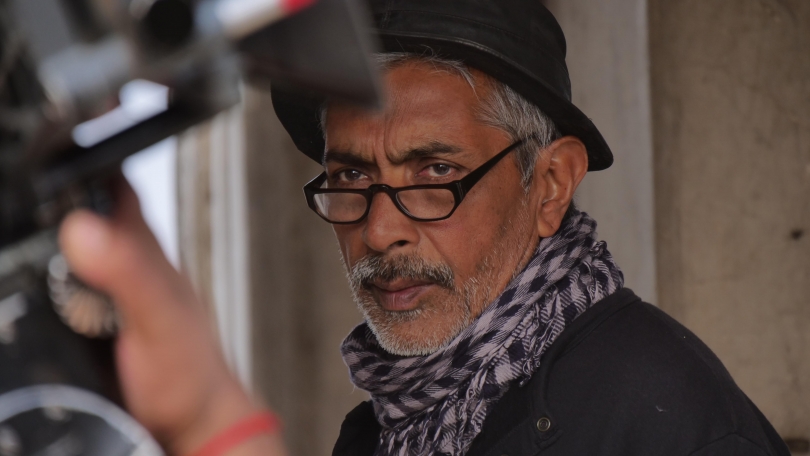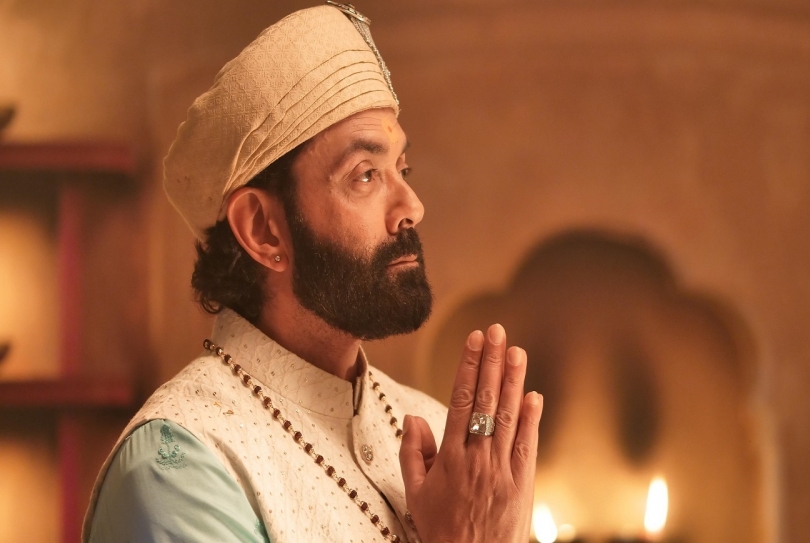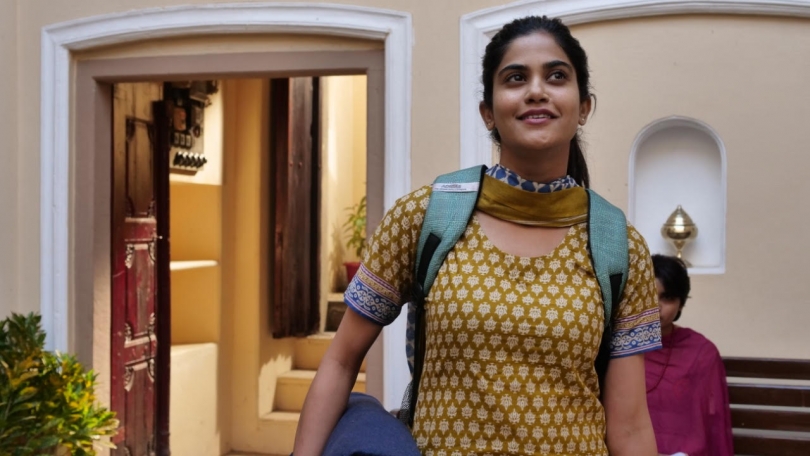|
|
||
|
Pro Tools
FILMFESTIVALS | 24/7 world wide coverageWelcome ! Enjoy the best of both worlds: Film & Festival News, exploring the best of the film festivals community. Launched in 1995, relentlessly connecting films to festivals, documenting and promoting festivals worldwide. Working on an upgrade soon. For collaboration, editorial contributions, or publicity, please send us an email here. User login |
Aashram Grih-Pravesh, Overview: Lacks originality, packs technicality
Aashram Grih-Pravesh, Overview: Lacks originality, packs technicality Aashram is a nine-episode web series currently streaming on MX player, released on 28th August, and available for watching free. It is an MX Original Production. Episodes vary in duration from 45 to 55 minutes. Based in the fictional city of Kashipur, there is an empire created by a self-proclaimed Godman, Kashipur Wale Baba Nirala, who derives his power from the influence he has over the lower strata of the society. There is a huge divide between the ‘harijans’ and upper caste members of society. When a lower caste man gets married and wants to go through the upper class settlements, on traditional horse-back, a riot ensues and one lower caste victim is almost killed. Kashipur has a corrupt police force and corrupt government. The Chief Minister is the epitome of corruption, as is his predecessor and challenger. The lower caste crowd lodges a complaint of attempted murder, against the advice of the police. And sure enough, as soon as this news reaches the upper caste honchos, they decide to prevent the wounded man from getting treatment at the hospital, holding the entire medical team hostage. Just then, Baba arrives, and with him comes a whole army of his retinue. He literally grabs the upper caste ring-leader by the testicles, and the matter is settled. There have been more such incidents, when Baba has stood for them, and they consider him to be their Messiah! A lower caste girl, Pammi, a powerful wrestler, is drawn into his devotion, because it was she and a few others who had lodged the FIR, and his intervention saved the day. It is an uphill task for wrestler Pammi, who is good enough to beat the local favourite, but has referees giving decisions against her, purely because she comes from a lower caste and her opponent is a high caste-member. She is later taunted in the school canteen by the same opponent, and this gets her goat. She attacks her opponent and pins her to the ground, with everybody watching. Later, her brother is shocked to find that his employer has deducted half his salary because he was part of the First Information Report (FIR) for attempted murder, against the upper caste barons. Just then, a bunch of goons come to his place of work and ask about the whereabouts of his sister. When he says she must be in school, they tell him she has not been going to school for many days, and rough him up. “Let us know when she is back”, they growl. Over the years several girls have disappeared from a bus junction from where the route leads to the Aashram. Pammi’s brother finds that his sister too has become a Baba devotee and instead of school, she goes to the Aashram. She even lies to her family to cover-up her visits. Kashipur Wale Baba Nirala, meanwhile, is plagued with nightmares, about being found out, though his right-hand man Bhopa Swami assures him that he had eliminated all traces of the heinous crime committed at Baba’s behest. Government forest land is allotted for development, at a throwaway price to Mishra developers. While the forest is being cleared through machines, the sudden resurfacing of a skeleton in the land disrupts the peace of the city, in the crucial times of the upcoming state elections, and all the links of the investigation mysteriously point towards one place--the Aashram. The opposition leader makes capital of the discovery of the skeleton, and tries to whip up anti-incumbent sentiment, but his most loyal pawn deserts him, and the movement loses steam. The skeleton is sent for post-mortem and forensic analysis, but the police Inspector in-charge is warned that nothing contrarian should emerge from the reports, for any adverse publicity will hinder the Chief Minister’s election prospects. He is corrupt to the core and a boot-licker, so he has no qualms about influencing the post-mortem report. He is already adept at taking away all video coverage of any untoward incident by force, from domestic TV channels. But when he encounters Dr. Natasha, the beautiful doctor who is performing the post-mortem, and sees her unflinching commitment to her duty, he begins to fall for her. Doubts begin to float about Kashipur Wale Baba Nirala truly being a Messiah! There has been so much in the media, and so much in real-life too, about pretender God-men, and their black deeds, that the only way you can hold interest in such a subject is by showing greater debasement and gorier violence, greater lust for power and labyrinths of corruption. That is the route taken by Aashram Grih-Pravesh. A large cast, larger mobs, sticks and guns in full flow, cold-blooded murder, ...you name it. So true rings the tale that a detailed disclaimer had to be incorporated, claiming that the vast majority of sadhus and babas are doing good work, but it is the rotten apples that the series is talking about. Story is credited to Habib Faisal, and one has to give it to him that the plot and the progression beep you engaged. Dialogue by Sanjay Masoom tries to infuse humour by having a character say, “Skeletons found in cup-boards can be problematic. A skeleton found in a forest is no issue at all”. On another occasion, a thug, pushing away the inquisitive videographer, indulges in word play about uchit, anuchit, uchit, anuchit…(acceptable, unacceptable). It’s hilarious, but lost in the melée. Screenplay and dialogue is also credited to Kuldeep Ruhil, and now we have a problem. Who contributed what? Oh! That’s not enough! Three other names fleet across, all credited in the writing department. But to their credit, the product does not look uneven or differently paced. Swear words galore, at every turn, and not the harmless kind. So stay warned.
Producer Prakash Jha has been making films on political and social issues for decades. The 68 year-old made Jai Gangaajal, The Revolution Has Begun, Chakravyuh, Reservation/Aarakshan, Politics, Apaharan, Gangaajal, Rahul, Dil Kya Kare and Mrityudand: The Death Sentence. Last week, he told the press, “If he happens to remind you of some godmen currently languishing in jail, remember my protagonist is fictitious, “a small-time criminal who masquerades as baba”. (He does not appear small-time in the series at all). Baba Nirala, he says, is a representative of the faction that "exploits people’s faith and trust" to run a business empire. "It’s like those two-penny doctors who start a dispensary in a village but know nothing about medicine. People are so gullible that they line up. A culture permeates where people are equally to blame," said Prakash Jha. Religion is also far from the show’s purview, said Jha, allaying fears of those "dissenting on social media in apprehension that the show is attacking Hindu faith". "Inside the ashram there’s no talk of god, goddess, ritual, faith. We have not indicated or shown or taken reference of any religion. We work with great responsibility and we can’t bring disrepute to any religion." The reason the filmmaker agreed to do the show, brought to him by MXPlayer, was to highlight how a case of few rotten apples can "bring disrepute to religion and its gurus and saints". Aashram, he says, is more concerned with the idea of “aastha” and the perils of worshipping one individual as God.” The series, of course, is not as sanitised as Jha’s statements, and cannot be, if it wants to unfold as a crime drama, intending to keep the audience on the edges of their seats. As director, he shows attention to detail and in the casting of minor characters, and some scenes are imaginatively shot, for example the scene where Pammi's brother follows her to the Aashram. Wrestling scenes look realistic, obviously the work of training and rehearsals. Technically, we are treated to some finesse.
Bobby Deol is miscast as Kashipur Wale Baba Nirala, though physically, he might suit the character sketch that the makers might have drawn. It is a bold, surprise choice. He does not lack confidence, but just does not jell as Baba. Ah yes, he seems completely in character grabbing his adversary by the testicles in a tasteless scene. Of course, this assessment is based on the early episodes and maybe he will redeem himself. Aaditi Pohankar is a bundle of dynamite, and full of spunk, playing Pammi. Chandan Roy Sanyal oozes bravado as Bhopa Swami and looks suitably menacing. Poor Kumar Rampravesh! He is at the receiving end of some genetic experiment when Baba makes a grab at him. Anupriya Goenka as Dr. Natasha does a fine job. Rest of the cast could not be identified. But here are their names and roles: Tushar Pandey: Satti Darshan Kumar: Ujagar Singh Tridha Chowdhury: Babita Adhyayan Suman: Tinka Singh Rajeev Siddhartha: Akki Anurita Jha: Kavita Parinita Seth: Sadhvi Mata
Priyankar Basu is the sync sound recordist, and it’s a job well done. Original music score is by Advait Nemlekar. There are times when there is too much of it, but he manages to employ a judicious blend of Indian classical, western and theme music, most of which contributes to the suspense. Sound design and re-recording is by Ajay Kumar P.B. Occasionally, the Vedic hymnal chanting becomes a little too much, and there are times when the sound is too loud. But overall, it is just fine. Editor Santosh Mandal maintains the pace and the sense of urgency. Action is quite evenly paced, and highs and the plateaus well-balanced. Chandan Kowli captures the earthy shades of a small town, and contrasts it with the regal splendour which is the hallmark of the Baba. He uses a drone well, especially in the skeleton discovery shot, and makes sure he gets reaction shots from most characters, even if they are six-frames in length. Overall, acquits himself well. 06.09.2020 | Siraj Syed's blog Cat. : Aaditi Pohankar Adhyayan Suman Ajkay Kumar P.B. Anupriya Goenka Anurita Jha Bobby Deol Chandan Kowli Darshan Kumar Tridha Chowdhury Habib Faisal Kuldeep Ruhil Kumar RamPravesh Mandal Parinita Seth Prakash Jha Priyankar Basu Rajeev Siddhartha Sanjay Masoom Tushar Pandey Independent FILM
|
LinksThe Bulletin Board > The Bulletin Board Blog Following News Interview with EFM (Berlin) Director
Interview with IFTA Chairman (AFM)
Interview with Cannes Marche du Film Director
Filmfestivals.com dailies live coverage from > Live from India
Useful links for the indies: > Big files transfer
+ SUBSCRIBE to the weekly Newsletter Deals+ Special offers and discounts from filmfestivals.com Selected fun offers
> Bonus Casino
User imagesAbout Siraj Syed Syed Siraj Syed Siraj (Siraj Associates) Siraj Syed is a film-critic since 1970 and a Former President of the Freelance Film Journalists' Combine of India.He is the India Correspondent of FilmFestivals.com and a member of FIPRESCI, the international Federation of Film Critics, Munich, GermanySiraj Syed has contributed over 1,015 articles on cinema, international film festivals, conventions, exhibitions, etc., most recently, at IFFI (Goa), MIFF (Mumbai), MFF/MAMI (Mumbai) and CommunicAsia (Singapore). He often edits film festival daily bulletins.He is also an actor and a dubbing artiste. Further, he has been teaching media, acting and dubbing at over 30 institutes in India and Singapore, since 1984.View my profile Send me a message The EditorUser contributions |































